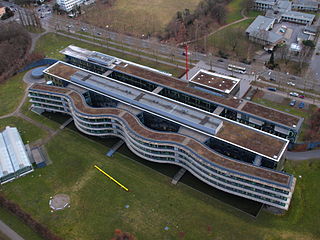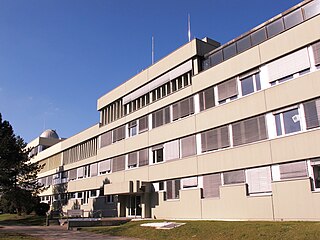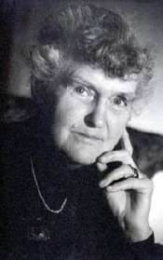
The University of Bonn, officially the Rhenish Friedrich Wilhelm University of Bonn, is a public research university located in Bonn, North Rhine-Westphalia, Germany. It was founded in its present form as the Rhein-Universität on 18 October 1818 by Frederick William III, as the linear successor of the Kurkölnische Akademie Bonn which was founded in 1777. The University of Bonn offers many undergraduate and graduate programs in a range of subjects and has 544 professors. The University of Bonn is a member of the German U15 association of major research-intensive universities in Germany and has the title of "University of Excellence" under the German Universities Excellence Initiative.

The Max Planck Society for the Advancement of Science is a formally independent non-governmental and non-profit association of German research institutes. Founded in 1911 as the Kaiser Wilhelm Society, it was renamed to the Max Planck Society in 1948 in honor of its former president, theoretical physicist Max Planck. The society is funded by the federal and state governments of Germany.

The Max Planck Institute for Astrophysics (MPA) is a research institute located in Garching, just north of Munich, Bavaria, Germany. It is one of many scientific research institutes belonging to the Max Planck Society.

Friedrich Ernst Peter Hirzebruch ForMemRS was a German mathematician, working in the fields of topology, complex manifolds and algebraic geometry, and a leading figure in his generation. He has been described as "the most important mathematician in Germany of the postwar period."

Max Planck Institute for Neurobiology of Behavior – caesar in Bonn is a non-university research institute of the Max Planck Society. It was founded on 1 January 2022. The institute had been associated with the Max Planck Society since 2006, known as the Center of Advanced European Studies and Research (caesar) and has had its focus on neurosciences since this time.

The Max Planck Institute for Mathematics is a research institute located in Bonn, Germany. It is named in honor of the German physicist Max Planck and forms part of the Max Planck Society (Max-Planck-Gesellschaft), an association of 84 institutes engaging in fundamental research in the arts and the sciences. The MPIM is the only Max Planck institute specializing in pure mathematics.

The Gottfried Wilhelm Leibniz Prize, or Leibniz Prize, is awarded by the German Research Foundation to "exceptional scientists and academics for their outstanding achievements in the field of research". Since 1986, up to ten prizes have been awarded annually to individuals or research groups working at a research institution in Germany or at a German research institution abroad. It is considered the most important research award in Germany.

Ernst Zitelmann [tsi:tlman] was a German jurist who specialized in the dogmatics of civil law.

The Max Planck Institute for Brain Research is located in Frankfurt, Germany. It was founded as Kaiser Wilhelm Institute for Brain Research in Berlin 1914, moved to Frankfurt-Niederrad in 1962 and more recently in a new building in Frankfurt-Riedberg. It is one of 83 institutes in the Max Planck Society.

The Max Planck Institute for Radio Astronomy (MPIfRA) (German: Max-Planck-Institut für Radioastronomie) is located in Bonn, Germany. It is one of 80 institutes in the Max Planck Society (German: Max-Planck-Gesellschaft). 50°43′47.6″N7°4′9.2″E
The Max Planck Institute for Research on Collective Goods is located in Bonn, Germany. It is one of 80 institutes in the Max Planck Society. The institute focuses its study on law, economics and politics of collective goods.
Wolfgang Gentner was a German experimental nuclear physicist.

The Max Planck Institute of Psychiatry is a scientific institute based in the city of Munich in Germany specializing in psychiatry. Currently directed by Elisabeth Binder and Alon Chen, it is one of the 81 institutes in the Max Planck Society.

The Max Planck Institute (MPI) for Biology of Ageing, founded in 2008, is one of over 80 independent, non-profit-making institutes set up under the umbrella of the Max Planck Society. The overall research aim is to obtain fundamental insights into the aging process and thus to pave the way towards healthier aging in humans. An international research team drawn from almost 40 nations is working to uncover underlying molecular, physiological and evolutionary mechanisms.

Theater Bonn is the municipal theatre company of Bonn, North Rhine-Westphalia, Germany. It is an organization that produces operas, musicals, ballets, plays, and concerts. It operates several performance venues throughout the town: Oper Bonn for music theatre, the Kammerspiele Bad Godesberg and Halle Beuel for plays, and the Choreographisches Theater for ballet and dance.
The Geistervariationen, or Theme and Variations in E-flat major for piano, WoO 24, composed in 1854, is the last piano work of Robert Schumann. The variations were composed in the time leading up to his admission to an asylum for the insane and are infrequently played or recorded today.

Geliebte Clara is a Franco-German-Hungarian 2008 film, directed by Helma Sanders-Brahms, her last film before her 2014 death, about the pianist Clara Schumann and her marriage with the composer Robert Schumann.

The Bonn tramway network forms part of the public transport system in the city Bonn, North Rhine-Westphalia, Germany, along with the Bonn Stadtbahn with which the tramlines are heavily integrated. The tram network consists of three tram lines which makes Bonn's tramway relatively small, as it comprises only 29.52 kilometres (18.34 mi) of route. The tramway is operated by 24 low-floor tramcars.

Margarete Ulrike Augusta Marie Karoline Elsa Reger was a German writer, the wife of the pianist and composer Max Reger, whose memory she kept alive by founding an archive, the Max-Reger-Institute, and a foundation, all dedicated to him and his work. The foundation is now named after her.
Thomas Synofzik is a German musicologist. He is director of the Robert Schumann House in Zwickau.




















